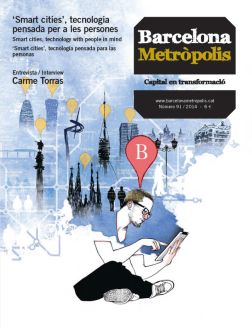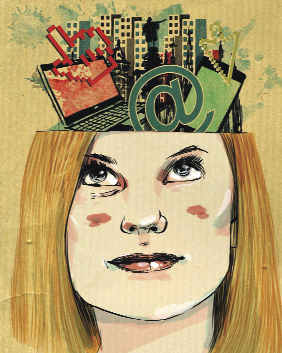There is a need for a story about the smart city that puts the social and political challenges on the table, and can ask critical questions about our cities. We have to widen the concept so that it can represent the experience of citizens’ daily lives.
After taking centre stage in the institutional debate in recent years (in the form of conferences, plans, pilot projects, etc.), the smart city is still unable to explain itself in a comprehensible way. Few concepts relating to the urban agenda have been able to attract as much attention in such a short time and generate as much confusion, and today there are nearly as many dissidents, critics and sceptics as there are enthusiasts.
Undoubtedly, the main success of the discursive machinery promoting smart cities is having found its way so quickly onto the agenda of urban policies. However, there is still a need for an understandable, user-friendly narrative for the public, who have reacted with a weary indifference to this new language, which politicians have adopted surprisingly easily as a new resource for public communications. This is acknowledged by Júlia López, the head of the Barcelona City Council’s smart cities department, when she suggests that “it makes much more sense to talk about technologies for transforming the city. If the city is going to dedicate time and resources to smart cities, this must be justified very well, with an emphasis on the desire to transform the urban setting.”
A rough assessment of the current situation, without dismissing the projects and initiatives it has really been possible to start up, shows a great deal of fuss about the role of technology in the city, and at the same time a great deal of confusion about what smart cities actually mean for everyday life. At least, this is how it might be perceived by anyone approaching the subject who has not found anything tangible beyond the big-picture concepts driving the narrative of the smart city. Its origins are explained by Paco González (architect at Radarq, lecturer on the Town Management and Urban Planning programmes at the Universitat Oberta de Catalunya): “It is an offer created by global technology companies, and municipal administrations and governments respond to it with strategies and programmes which seek to attract these investments of technological capital, with the intention of developing the new ICT economy.”
Disenchantment
The main unknown quantity is what will be the role of the public in these transformations, beyond their disenchantment with a story based on dazzling promises illustrated with futuristic computer renderings, complex diagrams of interconnected urban services, and a technical language far removed from the everyday experience of the citizen. The underlying discourse has placed the spotlight on technological solutions to automate public services such as transport, rubbish collection, lighting, etc., and explanations have been focused on persuading institutions of the need to implement these solutions. But it is necessary to construct a story of the smart city from the point of view of the everyday lives of the public, which puts social and political challenges on the table, and which can ask questions about itself. Paco González is critical on this question: “The model is similar to that of major infrastructure for transport: players who generate costs and structural changes affecting the city, which they profit from, without involving the citizens in the process.”
Life in cities is increasingly determined by digital technologies. We live in an accelerating state of interaction with connected objects, platforms and devices, sometimes without being aware of it (the digital traces we leave in Bicing, our image captured by a surveillance camera, or a city bus going by which is identified by a sensor, for example) and sometimes more consciously (looking for a place using GPS, connecting to a Wi-Fi network in a square, paying for parking, etc.). However, we lack a critical approach to the meaning of these digital traces. In a recent conference as part of the Open City cycle organised by the Centre de Cultura Contemporània de Barcelona (CCCB), Evgeny Morozov suggested some keys for approaching a critical re-reading of the meaning and consequences underlying the dominant discourse about smart cities, appealing to the need not to abandon civic responsibility and the critical spirit. Recent contributions in the form of books such as Adam Greenfield’s Against the Smart City or Anthony Townsend’s Smart Cities: Big Data, Civic Hackers, and the Quest for a New Utopia provide tools we can use for building a democratising model of the relationship with smart technology.
Centralisation or smart citizen
This scenario of a connected society is what the smart city seems to want to master in order to transform it into a totally centralised, automated, adaptable system which can be controlled in real time. That is why the smart Operations Centre of Rio de Janeiro has become the canonical image of this aspiration. Shouldn’t we expect something more than just efficiency? After all, today we all have access to cheap, simple technology enabling us to create our own solutions. Shouldn’t they also form part of the smart city story? On this question, the driving of open development models is one of the critical questions for Júlia López, who defends the role of city councils so that projects can be designed based on “the use of non-invasive open standards, guaranteeing the privacy of citizens while standardising solutions in all the cities in the world. It makes no sense for each city to have its own solutions, which cannot be used in other places. Cities have a very important role in this sense, in relation to companies and to the citizens.”
Having these open technologies is driving the rediscovery of common goods, the space of shared responsibility. The digital sphere has arrived quietly, but radically transforming society’s capacity to intervene in areas such as generating and distributing information, organising forms of collaborative management, creating technological solutions for local problems, or mediating in public debate. Collective action, self-organisation and co-creation are the foundations of a socially-aware approach to the transformational role of smart city technologies, in the form of projects relating to the science of cities, digital laboratories in their different forms of medialabs, hacker spaces, etc., digital interventions on facades and other interactive elements.
The smart city does not need to be made into a spectacle of magical solutions out of reach of the public, or an odyssey towards submission to the rules of automatic control. What we need is to construct a critical position as a society, for example, the ambitious proposals of the CCCB exhibition “Big Bang Data”, evidence of the need to look beyond the surface to confront the potential of big data, with its challenges, dangers and alternatives.




